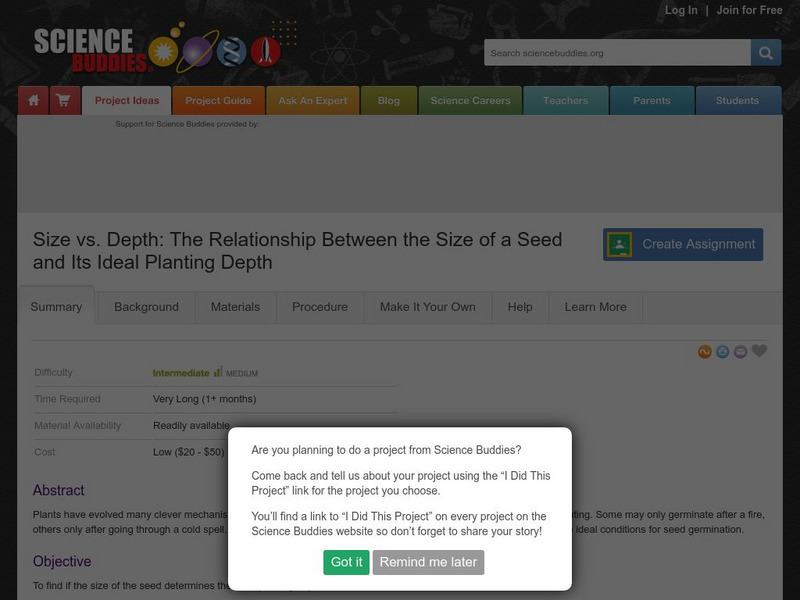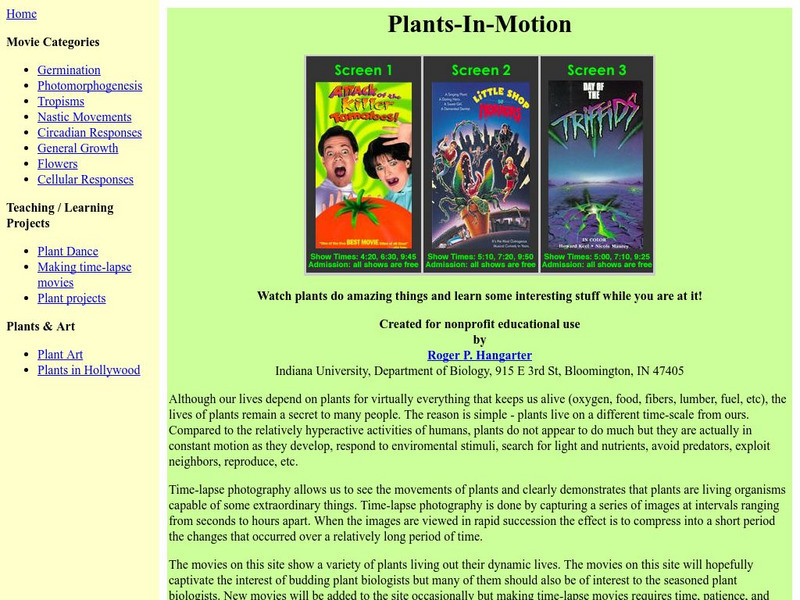Curated OER
Fungi
Pupils study fungi and its parts. In this exploring fungi lesson plan students fill out a worksheet that includes a diagram of fungi and questions.
PBS
Pbs Learning Media: Germinator
This ZOOMSci video segment teaches you how to germinate seeds in a plastic bag and helps you understand some of the factors that influence the germination process. [2:19]
Science Education Resource Center at Carleton College
Serc: Effects of Air Temperature on Seed Germination
Students investigate the effects of air temperature on seed germination by preparing seeds for germination and placing them in locations of varying temperatures. Students will monitor and record data concerning the temperatures and...
BiologyWise
Biology Wise: Process of Seed Germination
Describes the parts of a seed and the stages in its germination. Has a few embedded ads.
Science Education Resource Center at Carleton College
Serc: Investigating an Inquiry Approach to Germination Growth in Plants
In this lab, students investigate the effects of a variable on the germination of a small plant. They will compare the growth of their variable to a control then write a lab report to report their findings.
Science Buddies
Science Buddies: Planting Size vs. Depth
Plants have evolved many clever mechanisms to ensure that their seeds will wait for appropriate conditions before sprouting. Some may only germinate after a fire, others only after going through a cold spell. This project explores one...
Other
Rose Hills Foundation Conservatory for Biological Science
All about plants has information on plant parts--seeds, flowers, fruits, roots, and spores--and plant processes--seed dispersal, germination, pollination, and photosynthesis. You can also take a tour of this Los Angeles-based...
Indiana University
Indiana University: Plants in Motion
Plants grow and change on a time scale that is too slow for us to observe in real time. Time-lapse photography is a simple technique that allows us to see the movements of plants and clearly demonstrates that plants are living and...
Science4Fun
Science4 Fun: Seed Germination
Resource describes the process of germination and includes the parts of a seed, environmental conditions, and rate of germination.
BiologyWise
Biology Wise: An Overview of the Plant Growth Process
Discusses the basic needs of plants and the stages they go through in developing from a seed.
Science Buddies
Science Buddies: Cryopreservation: Freezing Plant Tissues
Cryopreservation-storing seeds in ultra-cold liquid nitrogen-is one method for maintaining plant genetic stocks in seed banks. The purpose of this project is to observe the characteristics and outcomes of cryogenically frozen seedlings...
Children's Museum
The Children's Museum of Indianapolis: Growing a Grass Head
Students learn about germination, or the process by which an organism grows from a seed and witness how seeds use sun, water, and soil to turn into a fascinating head of grass.
Center of Science and Industry
Cosi Columbus: Mighty Seeds
Learn about the process of germination in this hands-on science experiment. Includes full list of materials, procedures, and scientific explanation of why plants can survive in a variety of environments.
PBS
Pbs Teachers: Scientific American: Forever Wild? Input and Output
Investigate the scientific principles of biospheres, and observe the effects of biological processes on closed systems.
CK-12 Foundation
Ck 12: Fourth Grade Science: Life Science: Plant Reproduction
[Free Registration/Login may be required to access all resource tools.] Looks at the processes of sexual reproduction in flowering plants, including pollination, fertilization (seed production), seed dispersal, and germination.
CK-12 Foundation
Ck 12: Third Grade Science: Life Science: Plant Reproduction and Life Cycles
[Free Registration/Login may be required to access all resource tools.] Read about the processes of sexual reproduction in flowering plants, including pollination, fertilization (seed production), seed dispersal, and germination.
Biology 4 kids
Biology4 Kids: Plant Reproduction They'll Make More
Find out the basics of plant reproduction in this brief description of the process.
Biology Pages
Kimball's Biology Pages: Sexual Reproduction in Angiosperms (Flowering Plants)
This site, from retired Harvard professor John W. Kimball, provides a detailed but understandable explanation of sexual reproduction in flowering plants. Includes informative, well labelled illustrations.
Museum of Science
Museum of Science and Industry: Make a Friend From Soil and Seeds
Follow these step-by-step instructions to create a cute little friend with real-growing hair made of grass and grass seeds.
Alabama Learning Exchange
Alex: Seeds: How They Grow
The students will be collecting, germinating and planting seeds to show the process of plant growth. The students will be recording the information in their science journal. In addition, the students will be observing the water cycle as...










